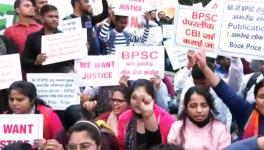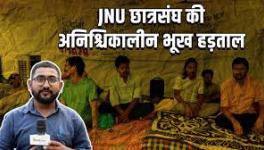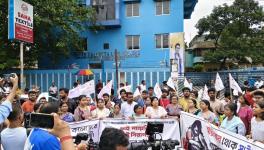JNUSU 1977-78: Restoring Students’ Rights After Emergency

Sitaram Yechury reading out a memorandum in front of Indira Gandhi, demanding her resignation as JNU Chancellor. Pic credit: The Hindu 'X' handle.
The article by Sitaram Yechury reproduced below is from the souvenir Jawaharlal Nehru University Students' Union: ‘30 Years in Defence of Progressive, Democratic, and Secular Culture’, published in 2004. He reminisces about the Emergency and his time as JNUSU President. It has been lightly edited for clarity.
Yes, I was elected as the President of the JNU Students' Union (JNUSU) thrice. But these three consecutive elections took place within the span of ten months! Those were the heady post-Emergency days when ultra democracy ruled the roost. I was also the last President to have been elected by all the students while the other office-bearer, General Secretary, was elected by the Council [the JNUSU Council, consisting of the elected office-bearers and councillors]. This constitution was thoroughly amended through a series of school general body meetings and a final University General Body Meeting, which lasted for days on end. It is this constitution which, I think, is the one currently guiding the JNU Students’ Union, and which created direct elections to the four posts of office-bearers (President, Vice-President, General Secretary, and Joint Secretary).
I joined JNU in 1973. The JNUSU was in a nascent stage. It had already made certain unique and substantive gains, one of them being that the university authorities had absolutely no role or say in the conduct of the union or in the conduct of the elections. This was to stand in favour of the students during the Emergency as the authorities could not "derecognise" the union.
I was elected as a Councillor from the School of Social Sciences (SSS) in 1974 and became the Convenor of the school. [The JNUSU Councillors from each school elect a Convenor from among themselves.] This was the period when the process of consolidation of the gains was to have been carried forward. Anand Kumar was the elected President. Having assured the electorate that he would not leave the Presidentship half-way and proceed on his scholarship to the United States, he did precisely that, causing a mid-term election. D.P. Tripathi of the Students’ Federation of India (SFI) won that election in January 1975.
But before the process of consolidating and advancing students' rights could move forward, such as by winning students’ representation in university bodies like the Court, Executive Council, etc., came the Emergency. Within two weeks of the declaration of the Emergency, on 8th July 1975, hundreds of armed police swooped down on the hostels. They carried away 69 students detaining 10 of them under the Defence of India Rules. The number would have been much more if the police had not committed the mistake of first encircling the Godavari Hostel. By the time they realised that this was not the boys' hostel that they were looking for, dawn was approaching. There was time only to go through Kaveri Hostel, picking up students at random. Many of us in Periyar Hostel were spared that experience, thanks to the incompetence of encircling the girls' hostel instead of the boys' hostel.
Clearly, the police action was to terrorise the student community. Needless to state, this, on the contrary, galvanised the JNU students. We went about organising an underground struggle against the manifestations of the Emergency inside the campus. Many of us formed a group called 'The Resistance' which issued a number of underground leaflets and organised demonstrative actions.
The authorities’ response to the students' resistance came with harsh efforts to destroy the Students’ Union. The membership of the union was made voluntary. A code of conduct was issued for the students. Twelve students who qualified for admission in 1975 were denied admission on political grounds. The JNUSU Council, opposing this anti-democratic act, called for the boycott of classes. That Council resolution was signed by SFI Councillor Ms. Ashok Lata Jain, who was suspended for this.
In protest, from September 24th to 26th, there was an unprecedented mass action. It was probably the first comprehensive student strike anywhere in the country against the Emergency. It was in the midst of this action, in a case that was to later become famous, that Prabir Purkayastha was kidnapped by P.S. Bhinder, who later became the Commissioner of Police. Prabir spent the rest of the Emergency in jail under the Maintenance of Internal Security Act (MISA).
Later, on the 6th of November, Tripathi was prevented from attending the meeting of the Academic Council, of which he was an ex-officio member as the President of the JNUSU. He was served with an expulsion order and later arrested on the 11th from inside the campus under MISA.
The Vice-Chancellor went about denying JNUSU any functional space and tried to set up nominated bodies in opposition to the Students' Union. Reflecting the true spirit of the JNU students' movement, almost all students declined such nomination.
During this time, the JNU Students’ Union acquired such a reputation that despite the Emergency and police terror, the meeting of the University Court, which was to be held in the campus premises, was shifted to Vigyan Bhavan, so that Ms. Indira Gandhi, as the Chancellor of the university, would not have to face protest. The Union Education Minister, who came to attend a function earlier in the campus, had to face a unique protest when all the students walked out of the hall when he rose to speak. The anti-authoritarian resistance was so strong in JNU that it was the NSUI that had to lead an underground resistance [against the anti-Emergency protests]!
The revocation of the Emergency and the defeat of Ms. Gandhi's Congress in the 1977 Lok Sabha polls led to an invigorating response for restoring and advancing the democratic rights of the students. The remnants of the Students’ Union elected in 1974 proposed to hold the elections to the JNUSU as per the normal schedule in October. But this proposal was defeated in the University General Body Meeting (UGBM), which, reflecting the post-Emergency urge, wanted a democratically elected union right away.
Thus came, in April 1977, the first of the elections in which I contested for the post of the JNUSU president. One by one, every single democratic right denied during the Emergency was restored ― the funds and the facilities for the Students’ Union; the participation of the JNUSU President and others in the Academic Council meeting; the repeal of all anti-student laws imposed during the Emergency; the restoration of the compulsory membership of the Union and its fees; the reinstation of all students who were suspended, expelled or denied admission; the restoration of the Student-Faculty Committees and the Board of Studies, and the scrapping of the code of conduct.
All these were achieved through a series of struggles that were launched by the JNUSU. The students' general body prepared a detailed and well-documented chargesheet against four university officials, namely the Vice-Chancellor, the Registrar, the Coordinator of Academic Affairs, and the Security Officer, for their overzealous implementation of Emergency rule in the campus. This led to a protracted struggle to "punish the guilty" that included the ouster of Ms. Gandhi as the Chancellor of the university.
This agitational programme continued after the regular elections to the Students’ Union in October 1977. In response to the movement to physically prevent the "guilty" from entering the university, the Vice-Chancellor closed the university sine die. The next month saw hectic activity when the library, the hostels, and the messes were run by the students themselves. Senior students took classes, and the public in Delhi responded warmly to a struggle fund that was collected under the slogan that the students were running the university while the Vice-Chancellor was on strike! In fact, The Statesman, the national daily, reported, "everything seems to be working normally except the Vice-Chancellor."
This struggle went on with various actions for over a month. This was the time when the Shah Commission, looking into the charges of excesses during the Emergency, short-listed six incidents, one of which was the daylight kidnapping from JNU campus. However, seeing the impasse of continued university closure, the JNUSU Council proposed to the UGBM to suspend this form of agitation declaring the campus out of bounds for the Vice-Chancellor. This proposal was defeated. The entire Council led by the President resigned after a marathon UGBM that lasted nearly 14 hours. This necessitated a mid-term election in February 1978. This was the last time that I contested and won. The struggle, however, did have its impact, and the Vice-Chancellor first was denied permission to attend the Vice-Chancellors' conference, and later instructed to quit before his term ended.
While all these struggles and activities dominated university life during this period, systematic consolidation of students' rights was also achieved. The foundations for the present character of the JNUSU took firm shape, and the various rights and facilities such as bus routes, banking, and postal facilities were established.
This was also the period when the JNUSU acquired a national reputation for expressing solidarity with democratic struggles all over the country and abroad. This was also a time when selfless work was undertaken by JNU students under the union's banner during natural calamities, like the cyclone that ravaged far away Andhra Pradesh in 1978 or the Delhi floods. Such was the general confidence in the JNU Students’ Union that on the latter occasion, the Army, which was called in to assist in the flood-affected areas, allowed full control of its boats and resources only to the JNUSU amongst the 84 national and international organisations doing relief work.
Today, as we look back at these three decades, one cannot but do so with a sense of pride at the unique achievements of the JNU students' movement. As always, the present circumstances impose newer challenges, some of which are graver than what the students' movement had to face in the past. The very concept of a modern Indian Republic wedded to secular democracy is under threat. It is only hoped that the JNU Students’ Union, carrying forward its glorious legacy, will rise to the occasion once again.
Sitaram Yechury, general secretary, Communist Party of India (Marxist), passed away recently at the age of 72.
Get the latest reports & analysis with people's perspective on Protests, movements & deep analytical videos, discussions of the current affairs in your Telegram app. Subscribe to NewsClick's Telegram channel & get Real-Time updates on stories, as they get published on our website.
























